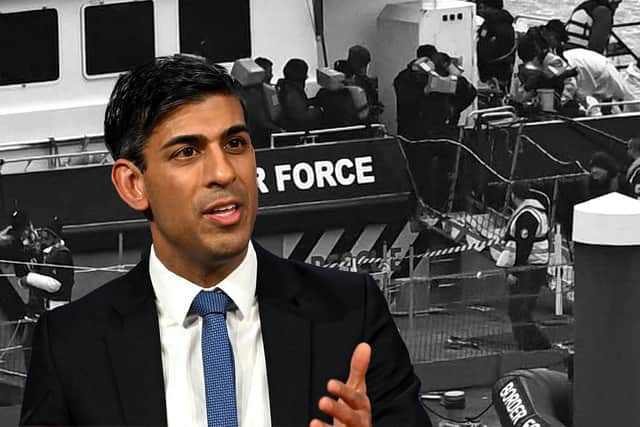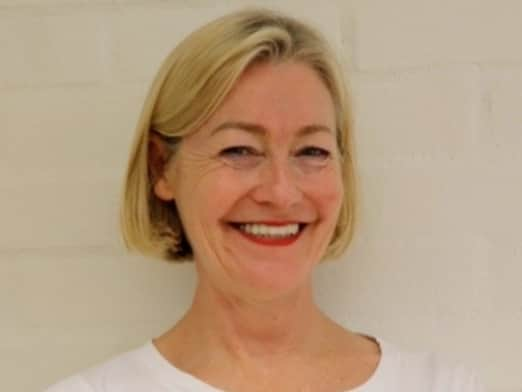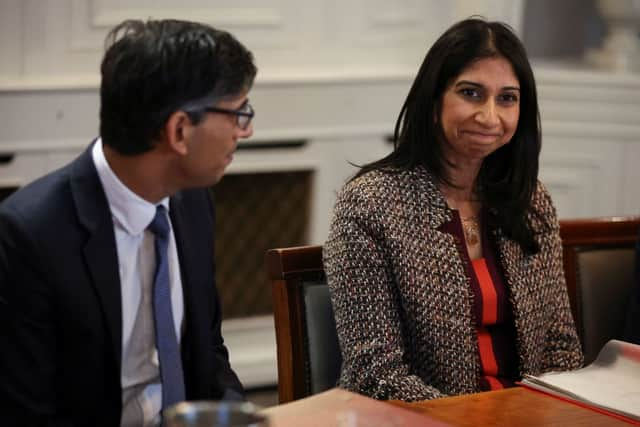Illegal Migration Bill: pregnant women and child refugees would be detained under new law, expert warns
and live on Freeview channel 276
Pregnant women and child refugees would be detained under the government’s proposed new immigration legislation, a lawyer has warned.
As Prime Minister Rishi Sunak and Home Secretary Suella Braverman’s controversial Illegal Migration Bill returns to UK Parliament, Annie Campbell, director of Bail for Immigration Detainees (BID), has told NationalWorld she has “a number of severe concerns” about the repercussions the possible new law could have on refugees.
Advertisement
Hide AdAdvertisement
Hide Ad“This bill dangerously extends detention and detainment possibilities,” the immigration lawyer of 15 years explained. “Currently, the government cannot detain vulnerable people - such as children, pregnant people, and victims of trafficking and torture. But under the Illegal Migration Bill, these protections would no longer apply.” This could put the UK in breach of international law, the Equality and Human Rights Commission has warned.
Sunak and Braverman have disagreed - saying they believe the government is “acting in compliance with international law”. They say they want to implement this new policy to prevent migrants arriving on small boats from “jumping the queue” - and to make things “fairer” for “those at home” and “those who have a legitimate claim to asylum”. Sunak explained: “My policy is very simple. It is this country, and your government, who should decide who comes here.”
But Ms Campbell has argued that the bill would take away asylum seekers’ “access to justice.” She explained: “Now, people in detention sites can go to court in relation to their claims. Judges of course don’t always rule in their favour, but at least they have that right.


“However, that right will soon be taken away from people,” she concluded - in a reference to the part of the Illegal Migration Bill which currently states: “If you arrive illegally in the UK, you will be detained with no recourse to immigration bail or judicial review within the first 28 days... We can maintain detention thereafter so long as we have a reasonable prospect of removal.”
Advertisement
Hide AdAdvertisement
Hide AdThe Home Office hopes that this “prospect of removal” will come from its plan to deport migrants to Rwanda. But Ms Campbell pointed out that even if the plan is proved lawful, the country in east Africa simply “does not have the capacity” to host everyone arriving in the UK, which means refugees will end up being detained for long periods of time.
“They’re creating a system in which vulnerable people are going to be facing indefinite detention,” she said. “These asylum seekers will have no idea what is going to happen to them - nor how long they will be detained for.”
“And let’s be clear,” Ms Campbell continued, “the conditions these refugees are staying in have a detrimental impact on their mental and physical health. We hear these stories of migrants staying in four-star hotels, but they’re not staying in four-star conditions. Groups are crammed into small rooms, the food and hygiene is poor, and the experience is highly stressful.”
When asked about one of the recent amendments to the Illegal Migration Bill - which states that child refugees will only be detained in the UK in "exceptional" circumstances and only deported to another country in "very limited" ones - Ms Campbell said she was concerned about the fact that it will be up to the government to decide what is defined as “exceptional”.


Advertisement
Hide AdAdvertisement
Hide Ad“It is deeply problematic when the people who are making these decisions are also the people intent on dismantling the asylum system,” she said. “And if you look at the way in which the government has talked about child asylum seekers in the past, it’s clear that their default position is ‘child asylum seekers are scamming the system.’
“So ministers are essentially going to be allowed to mark their own homework, which means the test for ‘exceptional’ is going to be ridiculously high.”
The Home Office also recently announced another ammendent to the bill, which would allow Home Secretary Braverman to ignore orders from human rights judges who attempt to block migrant deportation flights from the UK. This would be done by giving her the legal authority to disregard ‘Rule 39’ injunction orders from the European Court of Human Rights.
‘Rule 39’ orders can prevent migrants from being deported where there is “a real risk of serious and irreversible harm”, which is what happened to the first flight of asylum seekers meant to head for Rwanda.
Advertisement
Hide AdAdvertisement
Hide AdThis, Ms Campbell told NationalWorld, has “wider implications for democracy itself.” She explained: “Democracy works on the principle of checks and balances. The executive, the legislative, and and the judiciary all work in a way where they check each other. But here the government has removed the judiciary, and to some extent the legislative - making the executive the sole participant.”
The “single most effective” thing the Home Office could do to tackling the asylum seeker crisis is “start making decisions”, Ms Campbell said. “The backlog has been created by the fact that decision making has ground to a halt - and yet the government is trying to blame refugees.”
She suggested simplifying the system by making it clear that there are people you grant automatic asylum to, such as those who have come from Syria. “If you take these people out of that system, you can reserve your decision makers for the more complex cases,” she said.
Then, for those people, “you commit to making a decision within six months,” Ms Campbell suggested. “Because then there is perhaps an argument that, if you know you will only be there for six months, the accommodation situation is more tolerable. It’s intolerable when you end up languishing there for years on end.”
Advertisement
Hide AdAdvertisement
Hide AdShe also suggested creating more safe routes to the UK, as “despite what we’re told, there are incredibly few”, and scrapping the “ridiculous” Rwanda deportation plan - which she argued sends a “problematic message that other parts of this world are available for us to just dump people in when it suits us.”
“I also think Rwanda has a really difficult history of human rights abuses,” Ms Campbell continued, “and one that it hasn’t managed to shake off. There are still very serious questions about how it treats its refugees - as well as people who are considered to oppose its regime.”


Commenting on the Illegal Migration Bill, Home Secretary Braverman said: “The British public are rightly fed up with people coming to the UK through dangerous small boat crossings, and myself and the Prime Minister are absolutely committed to stopping the boats once and for all.
“The changes I am announcing today will help secure our borders and make it easier for us to remove people by preventing them from making last minute, bogus claims, while ensuring we strengthen our safe and legal routes.
Advertisement
Hide AdAdvertisement
Hide Ad“My focus remains on ensuring this landmark piece of legislation does what it is intended to do, and we now must work to pass it through Parliament as soon as possible so we can stop the boats.”
A spokesperson for Prime Minister Sunak added: “The Prime Minister is focused on delivering on his five priorities for 2023 – halving inflation, growing the economy, reducing debt, cutting waiting lists and stopping the boats.
“While we have been clear there is no silver bullet, our Stop the Boats Bill will ensure anyone arriving illegally will be detained and swiftly removed, ending the unfair practice of people skipping the queue.”
Comment Guidelines
National World encourages reader discussion on our stories. User feedback, insights and back-and-forth exchanges add a rich layer of context to reporting. Please review our Community Guidelines before commenting.
